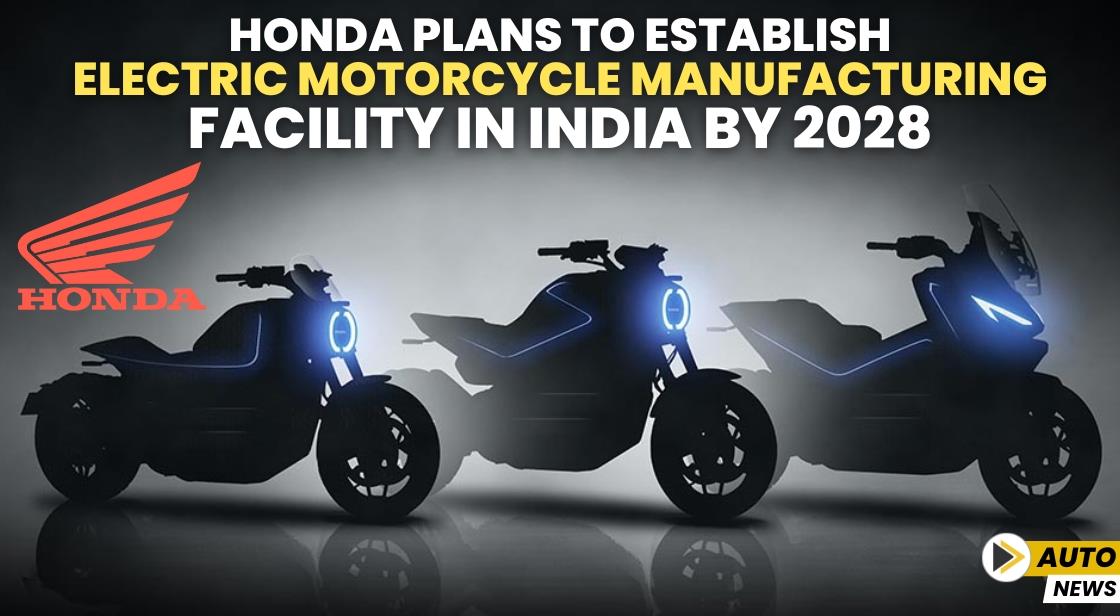Honda Plans to Establish Electric Motorcycle Manufacturing Facility in India by 2028

Podcast
News Synopsis
Honda Motor Company, Japan's leading automobile manufacturer, announced on Tuesday that it will begin operations at a dedicated electric motorcycle production plant in India by 2028. This move marks Honda's commitment to expanding its presence in the electric two-wheeler market in India, with the goal of producing a wide range of electric motorcycles that will compete with traditional internal combustion engine (ICE) models.
A Diverse Range of Electric Two-Wheelers
The new plant will manufacture a variety of electric two-wheelers, including electric motorcycles and scooters. Honda aims to make these electric models as cost-effective as traditional ICE motorcycles, with the total cost of ownership (TCO) over three years comparable to that of internal combustion engine vehicles. The electric models will be built by combining common modules that can be used across multiple electric vehicle (EV) models, offering greater efficiency in production.
Battery Procurement and Specifications
Battery procurement is a crucial aspect of the development of electric motorcycles, and Honda has been working closely with battery manufacturers to establish suitable specifications. The company intends to ensure a stable supply of high-quality batteries for its electric vehicles, ensuring they meet the specific needs of motorcycle usage.
India’s Growing Electric Two-Wheeler Market
The demand for electric two-wheelers in India has been rising due to government subsidies and increasing support for electric vehicles. As per Honda's global operations head, Minoru Kato, around one million units of electric two-wheelers are expected to be sold in India, contributing to approximately 5% of the total motorcycle market in the country. The rising demand, combined with new models from different manufacturers, has created an exciting opportunity for Honda to enter this rapidly growing sector.
Global Market Share and Honda’s Growth Plans
Honda aims to increase its market share globally, with plans to reach nearly 50% of the global motorcycle market, including electric vehicles (EVs). As of 2024, Honda’s global motorcycle unit sales are expected to reach 20.2 million units, accounting for approximately 40% of global motorcycle sales. The Asian market, including India, Indonesia, Thailand, and Vietnam, constitutes 85% of Honda's global motorcycle sales.
Launching New Models and Enhancing Commercial Appeal
Honda has plans to continue launching new models and enhancing the commercial appeal of its electric motorcycles. The company is focused on meeting customer needs and improving its offerings in the electric two-wheeler segment. In addition, Honda’s subsidiary, Honda Motorcycle & Scooter India (HMSI), will utilize its extensive sales network of 6,000 outlets across India to support the upcoming electric vehicles.
Addressing Battery Charging Concerns
A key concern for electric vehicle users is battery charging, and Honda plans to address this by expanding its charging infrastructure across India. The company will leverage its vast service network to provide comprehensive coverage and offer peace of mind to customers regarding charging and battery management. This approach aims to make it easier for customers to adopt electric vehicles in India by ensuring that charging stations are readily available.
Honda’s Global Electric Motorcycle Strategy
Honda has been making strides toward becoming a global leader in the electric motorcycle market. By 2030, the company plans to launch 30 electric models globally, with a target of selling 4 million electric motorcycles annually. This ambitious goal is part of Honda’s broader strategy to embrace electrification and position itself as a key player in the EV market.
Electric Motorcycle Models for India
In November 2023, Honda unveiled two electric motorcycles designed specifically for the Indian market: the Activa e: and the QC1. These models feature Honda’s Mobile Power Pack e: and a fixed battery, respectively, showcasing the company’s commitment to providing India with affordable and efficient electric motorcycles. With the introduction of 13 electric models already in progress, Honda is making steady progress toward achieving its goal of launching 30 electric models by 2030.
Conclusion
Honda’s move to establish an electric motorcycle plant in India by 2028 underscores its commitment to sustainability and innovation. By tapping into India’s growing electric two-wheeler market, Honda aims to meet the increasing demand for eco-friendly transportation options while ensuring affordability for consumers. With the launch of new models and continued investment in infrastructure, Honda is poised to lead the way in the global electric motorcycle revolution.





